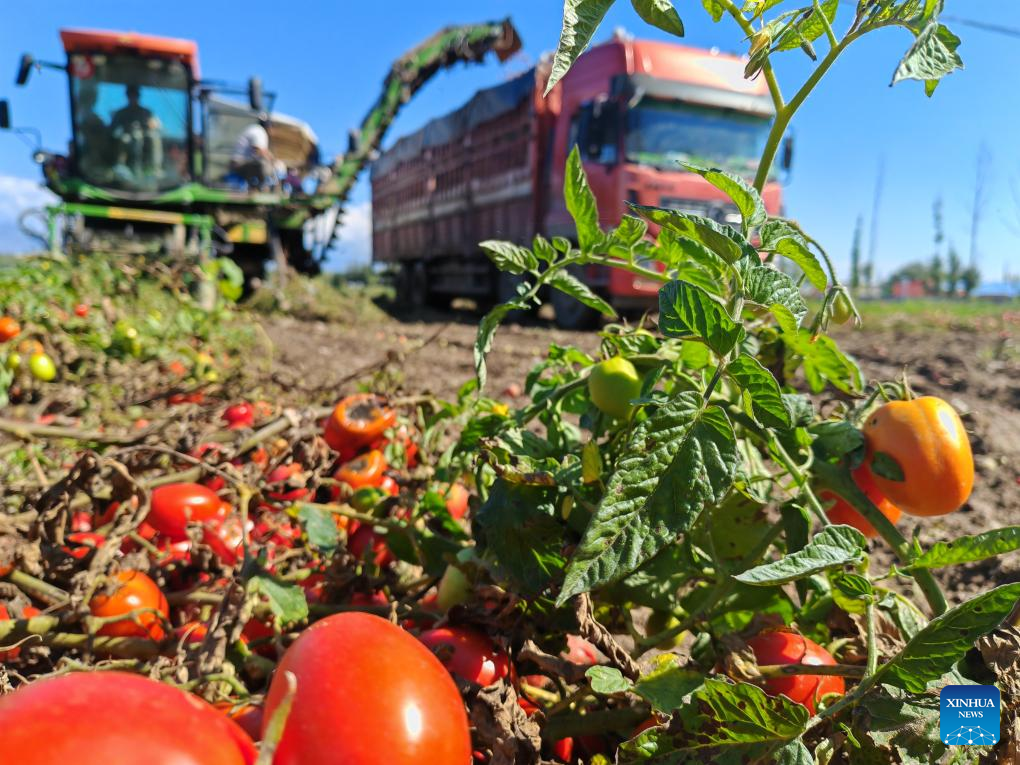Tomatoes yield fruitful outcomes in Xinjiang

Farmers air tomatoes on the Gobi desert in Bohu County, northwest China's Xinjiang Uygur Autonomous Region, July 31, 2024. (Photo by Liu Jiwei/Xinhua)
URUMQI, Oct. 31 (Xinhua) -- Tomato farming and processing in northwest China's Xinjiang Uygur Autonomous Region continue to achieve high yields this year, contributing to local economic development and delivering more income to farmers.
Against the backdrop of snow-capped mountains and a blue sky, harvest machines roared back and forth in the tomato fields and transport vehicles carried the red fruits to a ketchup processing plant.
Zhang Xiaodong, a tomato farmer from the region's Mongolian Autonomous Prefecture of Bortala, welcomed the busiest period of the year starting in late July -- the harvesting season for tomatoes.
"As the harvesting period is short, it is necessary to pick and process the tomatoes as quickly as possible," said Zhang, adding that the yield of his 107-hectare tomato field had exceeded 127 tonnes per hectare this year.
Zhang revealed that last year his net income per hectare had surpassed 15,000 yuan (about 2,100 U.S. dollars), two-thirds higher than the level in 2022.
Eyeing the tomato processing business, Zhang quit his job in a ketchup factory in 2019 and started planting tomatoes with his business partner.
Their entire process for tomato planting is now mechanized. Zhang applies three seeders for sowing and hires nine people to operate the machines, spending 2,100 yuan per hectare.
"Weeding, fertilizing and irrigation are all strictly managed based on the requirements of the processing companies to ensure no pesticide residues and compliance with the strictest export standards," said Zhang, adding that he also hires some 10 part-time workers of different ethnic groups for seedling transplantation, weed management, tomato harvesting and transportation. On average, they earn more than 500 yuan per person daily during the working season.
Xinjiang has long hours of sunlight and large diurnal temperature variations, making it an ideal location to develop tomato farming and processing.
Yang Tao, an associate researcher at the Xinjiang Academy of Agricultural Sciences, said tomatoes are mainly divided into fruit tomatoes, vegetable tomatoes and processing tomatoes according to different uses. What is planted on a large scale in Xinjiang is processing tomatoes.
According to Yang, also an expert in the field of tomato breeding research, the tomato processing industry in this region has gradually developed since the 1990s, with the northern slopes of the Tianshan Mountains and the Yanqi Basin being the main producing areas.
Tomatoes grown in Xinjiang have high levels of lycopene and soluble solids, while featuring fewer pests and molds. Therefore, Xinjiang ketchup is favored by consumers around the world, with these products exported to Europe, Southeast Asia and other regions.
Guided by leading enterprises, agriculturalists including Yang have developed several tomato varieties, ranging from extremely early- to early- and late-maturing options, allowing for a staggered harvest and balanced supply of raw materials and extending the production and processing period from the previous 45 days to the current 60 days.
"The additional 15 days mean that without increasing production capacity, tens of thousands of tonnes of fresh tomatoes can be processed annually, further reducing costs and enhancing the export competitiveness of Xinjiang ketchup," said Yang.
Industry experts said the export volume of China-made ketchup rose by 100,000 tonnes every year from 2021 to 2023 and some 80 percent of the total was produced in Xinjiang.
Notably, the domestic market is also expanding.
Tomatoes have won the favor of more and more people who pursue healthy and low-fat diets, and Xinjiang tomato products are gradually gaining popularity in the domestic consumer market, said a manager of a local tomato processing company. The manager added that the company's new products such as peeled whole tomatoes, tomato juice, tomato powder and diced tomatoes are being well received in the domestic market.
Yang confirmed that the domestic consumption of tomato products had reached 211,000 tonnes in 2023, representing an average annual growth rate of 8 percent.
"Diced tomatoes, in particular, are more widely applied in soup pots, meals, prepared dishes, Western cuisine and beverages, driving a rapid increase in domestic consumption," he said.

This photo taken with a mobile phone shows a picker harvesting tomatoes in Bole, northwest China's Xinjiang Uygur Autonomous Region, Sept. 12, 2024. (Xinhua/Gou Lifeng)

This photo taken with a mobile phone shows workers selecting and cleaning tomatoes at a ketchup factory in Shuanghe, northwest China's Xinjiang Uygur Autonomous Region, Sept. 13, 2024. (Xinhua/Gou Lifeng)

This photo taken with a mobile phone shows a picker harvesting tomatoes in Bole, northwest China's Xinjiang Uygur Autonomous Region, Sept. 12, 2024. (Xinhua/Gou Lifeng)
Photos
Related Stories
- Four green electricity and green certificate service stations put into operation in Urumqi, NW China's Xinjiang
- Autumn scenery attracts tourists in NW China's Xinjiang
- Wondrous Xinjiang: Populus euphratica forests attract tourists with autumn charm in southern Xinjiang
- Unique ecological cycle in NW China's Xinjiang provides feed for livestock
- Magnificent landscape of Baisha Lake in Xinjiang
Copyright © 2024 People's Daily Online. All Rights Reserved.









